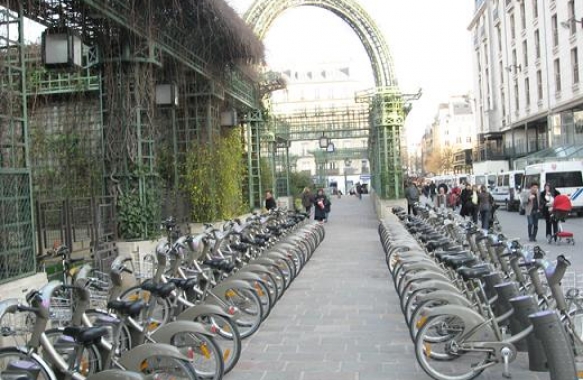The WWF is run at a local level by the following offices...
- WWF Global
- Adria
- Argentina
- Armenia
- AsiaPacific
- Australia
- Austria
- Azerbaijan
- Belgium
- Bhutan
- Bolivia
- Borneo
- Brazil
- Bulgaria
- Cambodia
- Cameroon
- Canada
- Caucasus
- Central African Republic
- Central America
- Central Asia
- Chile
- China
- Colombia
- Croatia
- Democratic Republic of the Congo
- Denmark
- Ecuador
- European Policy Office
- Finland
PARIS

Mayors to the rescue
In 2001, former Mayor Bertrand Delanoë was elected head of the city with one of the most congested traffic systems in Europe. He generated an ambitious multi-pronged plan, including Vélib', one of the first modern city-wide bike-share programs; public transport and road-calming measures including Green Neighbourhoods and Civilised Spaces; reduced parking; decreased private car lanes in favour of increased bus and bike lanes; and more public transport to the city suburbs.
The vision was to reduce car traffic by 40% before 2020 without congestion charges. Le Mobilien, a BRT type network of rapid bus lines with dedicated lanes and a new network of trams were installed, and Autolib', a car-pooling programme of some 3,000 electric cars building on the Vélib' concept, was set in motion - which by now has enjoyed 5 years of consistent growth in use.
Anne Hidalgo, the first female mayor of Paris, has continued Delanoë´s green transport policies with a host of actions, including 30 km/h speed limit zones, and incentives for reducing car use. She announced plans by 2020 to completely ban diesel vehicles and double the total length of bicycle lanes to 1,400 km, while also supporting the development of new hiring schemes for electric scooters and bicycles. Hidalgo has also unveiled plans to pedestrianise a large part of the right bank of the Seine in the heart of the city, continuing the work from the left bank where in 2013 2.4 km were reclaimed from cars. Furthermore, Paris, global Earth Hour Capital of 2016, has launched under her administration a new Smart and Sustainable City project focused on smart city technology and participatory governance.
Vélib'
Vélib' is a large-scale public-private system, financed through advertising. Paris has signed a contract with JCDecaux, which means that the advertising company bears the full cost of Vélib' in return for exclusive control over a certain number of billboards. This funding model is actually just a development of the company’s previous contracts for bus stops and is perhaps the main reason for Vélib's success. Problems of theft and vandalism have haunted Vélib' too. As many as 80 percent of all bikes which were put out on the streets the first two years needed to be replaced with new ones.
Vélib' was the spark that ignited a wildfire of urban investment in bike-sharing systems these past few years. By 2011 the trend had spread to more than three hundred cities. Some of the larger programmes – with more than 5,000 bicycles – are in London, Barcelona, Montreal, Boston, Guangzhou, Beijing and Hangzhou. Most of these have funding models similar to that of Vélib'. The largest is Hangzhou's, with 50,000 bikes.


Velib © City of Paris
Ambitious action plans
A larger mission is the investment of €500 million, or 5% of the city´s investment budget, in projects chosen by the public through participatory budgeting up to 2020. Parisians get the chance to choose between a number of projects in new rounds every year, and are also invited to suggest their own projects on a website with the headline: "Madam Mayor: I Have an Idea". In the first round in September 2015, more than 40,000 citizen voted, launching 9 projects, including vegetation walls, "learning gardens” in primary schools, mobile rubbish collection points, co-working spaces for young entrepreneurs and transformation of abandoned places around the péripherique to spaces for concerts, exhibitions and films.
Most ambitious of all was the Paris Climate Summit which in December 2015 brought together the world’s governments to agree action targets, processes and financing for the implementation of greenhouse gas reductions and other global initiatives to combat the impacts of climate changein the post-2020 period. Paris not only hosted the global-level meetings, but also those by municipal leaders, culminating in the Paris City Hall Declaration, a global mission for carbon reductions by the world’s cities and regions, announced by Mayor Hidalgo and former Mayor of New York Mike Bloomberg. Since then, the momentum for city-level leadership has grown with the founding of the Global Covenant of Mayors for Climate & Energy, a common platform through which cities can demonstrate their commitment to taking ambitious action on climate change.
Want to know more about Urban solutions?
Contact Barbara Evaeus
Global Communications Manager,
WWF One Planet City Challenge
+46 70 393 9030
barbara.evaeus@wwf.se
Text by: Martin Jacobson and John Manoochehri
Last edited: 2017-03-15


